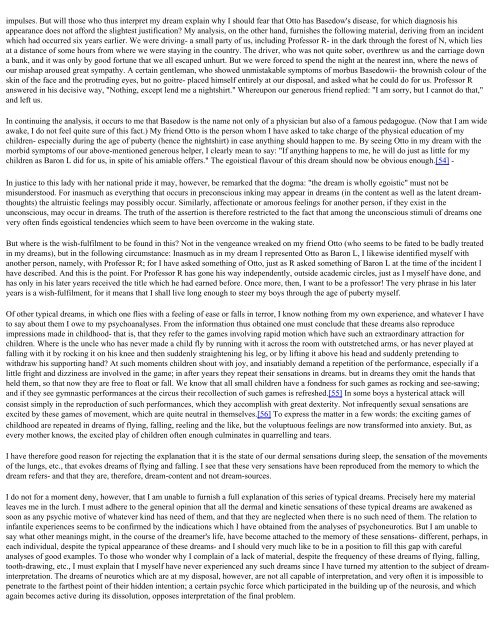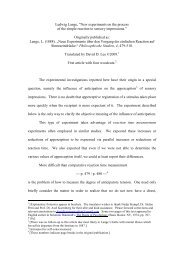The Interpretation Of Dreams Sigmund Freud (1900) PREFACE
The Interpretation Of Dreams Sigmund Freud (1900) PREFACE
The Interpretation Of Dreams Sigmund Freud (1900) PREFACE
You also want an ePaper? Increase the reach of your titles
YUMPU automatically turns print PDFs into web optimized ePapers that Google loves.
impulses. But will those who thus interpret my dream explain why I should fear that Otto has Basedow's disease, for which diagnosis his<br />
appearance does not afford the slightest justification? My analysis, on the other hand, furnishes the following material, deriving from an incident<br />
which had occurred six years earlier. We were driving- a small party of us, including Professor R- in the dark through the forest of N, which lies<br />
at a distance of some hours from where we were staying in the country. <strong>The</strong> driver, who was not quite sober, overthrew us and the carriage down<br />
a bank, and it was only by good fortune that we all escaped unhurt. But we were forced to spend the night at the nearest inn, where the news of<br />
our mishap aroused great sympathy. A certain gentleman, who showed unmistakable symptoms of morbus Basedowii- the brownish colour of the<br />
skin of the face and the protruding eyes, but no goitre- placed himself entirely at our disposal, and asked what he could do for us. Professor R<br />
answered in his decisive way, "Nothing, except lend me a nightshirt." Whereupon our generous friend replied: "I am sorry, but I cannot do that,"<br />
and left us.<br />
In continuing the analysis, it occurs to me that Basedow is the name not only of a physician but also of a famous pedagogue. (Now that I am wide<br />
awake, I do not feel quite sure of this fact.) My friend Otto is the person whom I have asked to take charge of the physical education of my<br />
children- especially during the age of puberty (hence the nightshirt) in case anything should happen to me. By seeing Otto in my dream with the<br />
morbid symptoms of our above-mentioned generous helper, I clearly mean to say: "If anything happens to me, he will do just as little for my<br />
children as Baron L did for us, in spite of his amiable offers." <strong>The</strong> egoistical flavour of this dream should now be obvious enough.[54] -<br />
In justice to this lady with her national pride it may, however, be remarked that the dogma: "the dream is wholly egoistic" must not be<br />
misunderstood. For inasmuch as everything that occurs in preconscious inking may appear in dreams (in the content as well as the latent dreamthoughts)<br />
the altruistic feelings may possibly occur. Similarly, affectionate or amorous feelings for another person, if they exist in the<br />
unconscious, may occur in dreams. <strong>The</strong> truth of the assertion is therefore restricted to the fact that among the unconscious stimuli of dreams one<br />
very often finds egoistical tendencies which seem to have been overcome in the waking state.<br />
But where is the wish-fulfilment to be found in this? Not in the vengeance wreaked on my friend Otto (who seems to be fated to be badly treated<br />
in my dreams), but in the following circumstance: Inasmuch as in my dream I represented Otto as Baron L, I likewise identified myself with<br />
another person, namely, with Professor R; for I have asked something of Otto, just as R asked something of Baron L at the time of the incident I<br />
have described. And this is the point. For Professor R has gone his way independently, outside academic circles, just as I myself have done, and<br />
has only in his later years received the title which he had earned before. Once more, then, I want to be a professor! <strong>The</strong> very phrase in his later<br />
years is a wish-fulfilment, for it means that I shall live long enough to steer my boys through the age of puberty myself.<br />
<strong>Of</strong> other typical dreams, in which one flies with a feeling of ease or falls in terror, I know nothing from my own experience, and whatever I have<br />
to say about them I owe to my psychoanalyses. From the information thus obtained one must conclude that these dreams also reproduce<br />
impressions made in childhood- that is, that they refer to the games involving rapid motion which have such an extraordinary attraction for<br />
children. Where is the uncle who has never made a child fly by running with it across the room with outstretched arms, or has never played at<br />
falling with it by rocking it on his knee and then suddenly straightening his leg, or by lifting it above his head and suddenly pretending to<br />
withdraw his supporting hand? At such moments children shout with joy, and insatiably demand a repetition of the performance, especially if a<br />
little fright and dizziness are involved in the game; in after years they repeat their sensations in dreams. but in dreams they omit the hands that<br />
held them, so that now they are free to float or fall. We know that all small children have a fondness for such games as rocking and see-sawing;<br />
and if they see gymnastic performances at the circus their recollection of such games is refreshed.[55] In some boys a hysterical attack will<br />
consist simply in the reproduction of such performances, which they accomplish with great dexterity. Not infrequently sexual sensations are<br />
excited by these games of movement, which are quite neutral in themselves.[56] To express the matter in a few words: the exciting games of<br />
childhood are repeated in dreams of flying, falling, reeling and the like, but the voluptuous feelings are now transformed into anxiety. But, as<br />
every mother knows, the excited play of children often enough culminates in quarrelling and tears.<br />
I have therefore good reason for rejecting the explanation that it is the state of our dermal sensations during sleep, the sensation of the movements<br />
of the lungs, etc., that evokes dreams of flying and falling. I see that these very sensations have been reproduced from the memory to which the<br />
dream refers- and that they are, therefore, dream-content and not dream-sources.<br />
I do not for a moment deny, however, that I am unable to furnish a full explanation of this series of typical dreams. Precisely here my material<br />
leaves me in the lurch. I must adhere to the general opinion that all the dermal and kinetic sensations of these typical dreams are awakened as<br />
soon as any psychic motive of whatever kind has need of them, and that they are neglected when there is no such need of them. <strong>The</strong> relation to<br />
infantile experiences seems to be confirmed by the indications which I have obtained from the analyses of psychoneurotics. But I am unable to<br />
say what other meanings might, in the course of the dreamer's life, have become attached to the memory of these sensations- different, perhaps, in<br />
each individual, despite the typical appearance of these dreams- and I should very much like to be in a position to fill this gap with careful<br />
analyses of good examples. To those who wonder why I complain of a lack of material, despite the frequency of these dreams of flying, falling,<br />
tooth-drawing, etc., I must explain that I myself have never experienced any such dreams since I have turned my attention to the subject of dreaminterpretation.<br />
<strong>The</strong> dreams of neurotics which are at my disposal, however, are not all capable of interpretation, and very often it is impossible to<br />
penetrate to the farthest point of their hidden intention; a certain psychic force which participated in the building up of the neurosis, and which<br />
again becomes active during its dissolution, opposes interpretation of the final problem.



